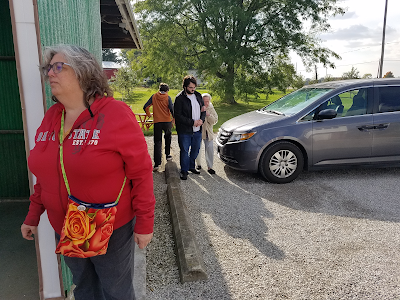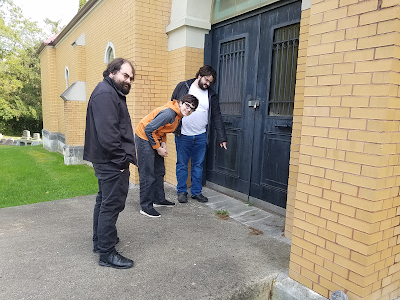Last year I wrote about the
games the family played most. Those were games that the whole family played together over the years. During the Covid years, our turning to board games became a major part of our family entertainment, since so many things we used to do were denied us by way of lockdowns and closings. And there are only so many movies you can watch without going bonkers.
In that list of games was the grand dam of the Sci-Fi/Fantasy genre - Dungeons and Dragons. Believe it or not, over the next couple months I had several tell me through one venue or another that they were shocked - shocked I tell you - that this Catholic, former Evangelical pastor, former Baptist no less, played that controversial game of games. Well, let me 'splain.
I've written several times over the years about how I first stumbled upon the game. How initially I detected no particular 'stigma' about playing it, from my peers or pop culture, any more than there was a stigma with the Trivial Pursuit fad or the Pac Man fad. I also have mused on the media driven coalition that aimed like a Death Star laser beam at wrecking the game, and how it succeeded. I've mentioned how, by the time I graduated high school, most guys I knew who played it not only stopped playing it, but denied ever having heard of the game. I always found that significant.
For my part, after hearing of it for the first time, I went out and bought all the books I could in order to see what it was all about. Walden Books and KB Toys were my main source. Problem was, upon actually playing at a local game group in the basement of the town's First Federal Savings and Loan, I was less than impressed. It was mostly fighting and arguing, which I could get aplenty in the locker room after the next gym class. After a few tries I more or less set the game aside. Besides, fantasy and sci-fi were not my cup of tea anyway.
Years later, preparing to head down to the main OSU campus for my junior year of college, I was playing poker with a group of friends after work. One of their friends from high school was there, and he invited anyone to join a game group he was part of that played a variety of games. I said sure, even though I didn't know him, and the group was already at the main campus. The Wednesday evening I first went there, they were playing Dungeons and Dragons. Usually it was D&D, or a variety of other card games, sometimes RISK or Monopoly, depending on how many showed up.
It was actually fun. The group was almost exclusively science/computer science majors. The referee (that's DM, or Dungeon Master, to those in the hobby) was, along with me, the only humanities major there. He was a literature major hoping to be a sci-fi/fantasy author. Perhaps because of his creativity, he made the game fun and accessible to me. A couple others tried their hands at running a D&D game over the next couple years, but I didn't find those as enjoyable.
Nonetheless, it being me at the time, I eventually worked them over toward more of a strategy/wargame focus. At one point we even spent a few months playing Empires and Arms (until the fellow's roommate made him take it down from the kitchen table).
After the group disbanded owing to life moving on, that was that. When I moved to Florida I knew nobody and had no contacts to call upon. I found a hobby store, because at that time I was trying to gobble up what old Avalon Hill wargames I could find. There was a D&D game going on in the store, made up almost entirely of grown men. One even drove a Corvette. Nonetheless, it reminded me of my first experience. Those grown men sat there fighting and arguing and almost yelling about what, to me, was a bunch of stupid trivialities about a game based on fighting dragons.
Then I met my future wife, and most such pastimes went into the rearview mirror. I brought up to her that I had played D&D, and did have fond memories about that time even though I seldom played it. Baptist that she was, however, it was a long time before she warmed up to the game or the genre.
When my boys came along, and heading into the 2000s, I noticed that there was a new wave of 'Fantasy/Sci-Fi/Comic Book' focus in pop culture. Driven by the news of Jackson's The Lord of the Rings films, and overflowing from the Harry Potter phenomenon, I called this the Second Fantasy Renaissance.
 |
| The obvious similarities only made Potter a bigger hit in the household |
Now the way I raised my kids was this. I wanted them to be aware of their generational surroundings, within reason. But I also exposed them to the things of my childhood, or earlier. Or things rooted in our older culture in general. Things I was interested in. I didn't shove it down their throats. I simply watched this old TV show or that old movie or read this or that older book from olden times. At the same time, I encouraged them - again, within reason - to follow or like the things around them. For instance, though I may not have cared for everything about the Potter books or the latest comic book movie, I found them harmless - at least compared to what I grew up with in the very freewheeling, promiscuous 70s and 80s.
It wasn't surprising that the boys glommed onto the Fantasy/Comics fad at the moment. That included seeing the newly revised D&D game, especially the vast line of plastic miniatures that accompanied it. Had I been their age, I probably would have loved those, too.
So I got my hands on the game (called by that time the 3rd Edition), and began priming the family for this, since I figured at least some of them would become interested in it anyway. I always felt that, without imposing myself into their lives, getting ahead of the trends was the smart way to go. Plus, I must admit, there is a strange sense of nostalgia for this game, even if I never did much with it in my youth. This has increased as, while I'm still no big fantasy/sci-fi fellow, I have grown to appreciate the genre more and have tried my hand at a variety of such books and movies over the years.
My wife warmed to the hobby because you could still buy the old lead miniatures. Those are ones you have to paint, for those with that particular skill. My wife, always the artsy-craftsy type, actually found those enjoyable. That was the gateway for her. The boys simply came along when I opened the door. I waited until my third oldest was at least old enough to have some idea about what was happening, and then began playing the game. Already they had heard about it, and this seemed the better way to introduce them, rather than letting the world do it.
After a few months, I confess I began to find myself under-impressed. I didn't care for the game books as presented. Yes, they were quality productions (until they fell apart from moderate use). But it made me think of a game trying to be a computer game on paper. The text was spartan and uninspiring. The game was somewhat 'blah' in terms of its feel. I seemed to recall a genuine feeling of inspiration when I read the original rule books back in the day. This new edition made me think of stereo instructions with elves. I compared it to chewing on tin foil.
At that point, I went down into our basement, found an old box with books and paraphernalia from my younger days, and located the old, original AD&D books I still had. Since I didn't play it much, they were in tiptop shape. Because the hobby at that time in the early 2000s was centered around the latest, hippest, I was able to find multiple copies of those old 1970s releases for pennies on the dollar. Today, perhaps because of the hobby bowing low before the Woke idol, such books will cost you in the hundreds.
I gave those old rule books to the boys, and they were immediately taken by the charm, the feel, the basic atmosphere that they evoked. For instance, in a section dealing with how to destroy items of special power called artifacts, one of the methods is:
"Cause it to be broken against/by or crushed by ... the Juggernaut of the Endless Labyrinth"
You have to admit, that is far better than 'do this feat with this skill at a -6 on your die roll' which was how the 3rd edition would render such actions. Or, when describing a character of the assassin class, the text reads:
"Assassins are evil in alignment
(perforce, as the killing of humans and other intelligent life forms for the
purpose of profit is basically held to be the antithesis of weal)."
Perforce? Antithesis of weal? Who writes like that for an instruction manual? The boys agreed. They said the new edition was simply a new edition of the original game. But the original game was not an edition of anything. Rather, it was the game statting direct inspiration from a wide variety of influences and cultural staples.
 |
| L: D. Trampier, 1st Ed AD&D, R: Lang's Green Fairy Book, 1900 |
As one historian once said, the original D&D game was a bit like a ball of Velcro rolled through the lint warehouse of late 20th Century Western culture. From mythology and folklore, to pulp fantasy and classical literature, from Bugs Bunny cartoons to Hammer Horror Films and Night Stalker episodes, the original rules took inspiration from anywhere and everywhere and simply added statistics. And it showed in the feel and appeal of the originals.
From that time on, the family warmed up to the game, enjoying the colorful (and at times quirky) presentation along with the more clearly defined links to the literary and cultural inspirations for the game. We played it over the years, sometimes months at a time, sometimes it would sit on the shelves for months at a time. But we always went back.







































.jpg)




